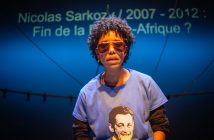In October 2014, independent theater maker Zuko Sikhafungana co-founded The Back Stage Theatre Production, an ensemble of young artists based in Lwandle, a black township located in Strand outside of Cape Town.
Lire l’article en français : Théâtre noir après l’apartheid : Une scène de crime

Zuko Wonderfull Sikhafungana
While the Lwandle township is made up of over 20,000 people, it is considered small compared to nearby townships such as Delft (150,000 habitants), Mitchel Plain (350,000 habitants) and Kayelitsha (400,000 habitants). Lwandle is an informal settlement shaped by the migrant labor system of the apartheid regime, one that dictated who got to live where, with whom, how and according to which economic opportunities until 1994. In Lwandle, the BSTP established itself as an empowering tool for its community, offering performing arts classes to kids in dire need of love, attention, and creative means of expression. The segregated geographies that commanded the obstruction of wealth, education, and health are still very much in place in the Western Cape and the Back Stage Theatre Production (BSTP) is here to tell the stories of under-privileged black people in Post-Apartheid South Africa, especially as they face tremendous attacks on their families due to crimes, drugs, and gangs.
The BSTP’s most recent production is The Crime Scene, an hour-long monologue brilliantly performed by lead actor Siphumzile Nelson Pharela in duo with actress/vocalist Zimkitha Ngaleka, two outstanding artists who give sound, voice, and presence to multiple characters both in Xhosa and in English within the play. The play was presented at the Drama Factory, 25-27 October 2018 and at the Theater Arts Admin Collective on December 8, 2018. Zuko Sikhafungana, who both wrote and stage-directed the play, recalls that in his career as a theater maker and university student, he never “came across a story, a play, or a novel that represented us (me),” namely people living in post-apartheid black townships. To portray the living conditions of his community, Zuko decided to write his own story. He started when he was still an undergraduate student at the University of the Western Cape, a historically marginalized institution created as a colored-people-only university. It was only a year after that Zuko started to seek an actor who could embody the complexity of the text which weaves together multiple characters into a polyphonic monologue. Zuko needed someone who could capture what it takes to survive crime and poverty, someone who could relate to what it costs to grew up in a society where father figures and role models have been dismantled by an oppressive system that ruins transgenerational relations. Zuko found in Siphumzile Nelson Pharela a powerful actor who could translate the feelings, capture the emotions, and apprehend the stories from its multiple angles-from within the ingenuity of its dramatic structure and poetry. Zuko informed me that “the process of staging the work took six months, this includes script readings and rehearsals.” They had rehearsals three days a week for two hours and I am pretty sure no audience member leaves the theater without feeling the commitment it took to write, stage, and perform this text.
The Crime Scene begins in a dead-end and ends in a void. Like a metaphor for so many lives that don’t get to be born in prosperity and whose experiences are muted by the prosperous ones against the hungry many, The Crime Scene is not here to appease your fragility, nor is it made for you to digest it easily, sleep it off, and forget about the story. In fact, you don’t get to wander or snooze during the show. There is no time for a dreamy ending or happy stories. On the contrary, The Crime Scene is as direct as a jab, as poignant as Nayyirah Waheed’s short poem.
The public enters and gets seated while Siphumzile Nelson Pharela is already on stage. You don’t get to see his face as he sits his head in his arms, already agitated by some sort of energy that is soon going to explode into a vibrant bi-lingual monologue. During the show, a caution tape is separating him from the public. The tape is continuously dividing the space between the public and the stage and also the shape that is his body who wanders on stage to tell the story of Xolani. Xolani is a young black man raised by a single mother who doesn’t know what to do anymore as she sees her son falling into the trap of alcohol and gang life. Siphumzile Nelson Pharela plays all the characters that are given life through Zuko’s text: the mother, the son, the father who returns for a short visit. His monologue is at times punctuated by the singing of Zimkitha Ngaleka, a powerful vocalist who translates into rhythm the feelings of the main characters. Zimkitha Ngaleka sings holding a candle whose light vibrates into the room as we witness the pain that is caused by the loss of social and family bonds. Her presence is one of a caring ancestor, of a wandering ghost, of a lost child who didn’t get to grow old enough to express what it means to be born here, in a post-apartheid black township. A man’s coat is placed on a hanger on the left side of the stage, bringing a strange sense of an absent figure right from the beginning. The coat, the tape, and the small stool that Siphumzile is using are the only elements used in this minimal set that is given life through the power of these two stunning actors. There is no need for much more when the whole story is about less: less chances, less freedom, less hope.
For over an hour, the text goes right to the point and sticks to the harshness of the living conditions. Yet, there is something universal about the depth of the feelings it creates: African-American and Afropean man and woman, boys and girls could relate to the play as it questions the impact of racial and economic segregation on social bonds. No surprise then that the central theme is the dismantlement of family figures. The apartheid regime was sadistic enough to separate families and trap male workers into segregated camps that prevented them from seeing their wives and children. Now, over two decades after the fall of the system, the families remain in shamble and it is through the failures of the social bonds that crime infiltrates the ground of Post-Apartheid Black families. If you want to understand how the brutality of the apartheid continues to penetrates the fabric of South African society, if you want to hear the stories of the black people living in extreme poverty where crime is a daily path that takes many lives, then you should hire The Back Stage Theatre Production and support their work by attending their shows and booking their workshops. There are no other ways around this. They are the ones to promote, the ones to be heard because their aesthetics is a means through which more accurate representation of post-apartheid living conditions can be seen, heard, and discussed in society.









